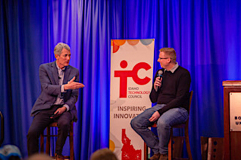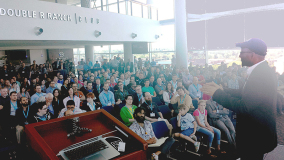No products in the cart.
Inscrutable
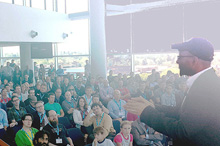
The Trouble with Tech Talk
By Jay W. Larsen
Some years back I mentioned the term “cloud technology” to an Idaho farmer who owned more than ten thousand acres. Only around the turn of the 21st Century did the cloud take hold as a delivery system of computing services over the internet that would help him to monitor the irrigation of his crops. The farmer looked at me for some time. Then he glanced up at the sky and said, “I know ag. I know irrigation. I already look at the clouds all the time to figure out when it’s going to rain. So what exactly do you mean by ‘cloud technology’?”
My late father, Dorrell Larsen, who had been one of the state’s top irrigation experts with the University of Idaho, might also have marveled at what this so-called cloud, paired with a global positioning system (GPS), could do for precision agriculture. I think he would have been astonished at the databases, software, storage, and analytics it could apply to the field (literally).
The language of progress often causes uncomfortable encounters such as the one I had with the farmer. And I think such strange language can be a deliberate ploy to retain ownership of a certain way of doing things. Every profession has its own lingo, which its members are quite comfortable with, but which also may be used to prevent the outside world from intruding. For example, a journalist “slugs” a story rather than just titling it, and neither a legal “brief” nor a real estate “short sale” is actually short.
Clearly, the jargon problem that worries me did not begin with technology. As someone who’s worked for elected officials and has coached kids’ sports teams, I’ve always tried to put myself in the listener’s place. For example, does the average voter know that “bundlers” are people who gather campaign contributions from their network of business associates, friends and relatives? Should kids new to baseball be expected to know that “throwing cheese, fuzz, heat,” or “aspirins” refers to pitching fastballs?
Jay (left) at a function with Idaho cybersecurity expert Dan
DeCloss. Idaho Technology Council.
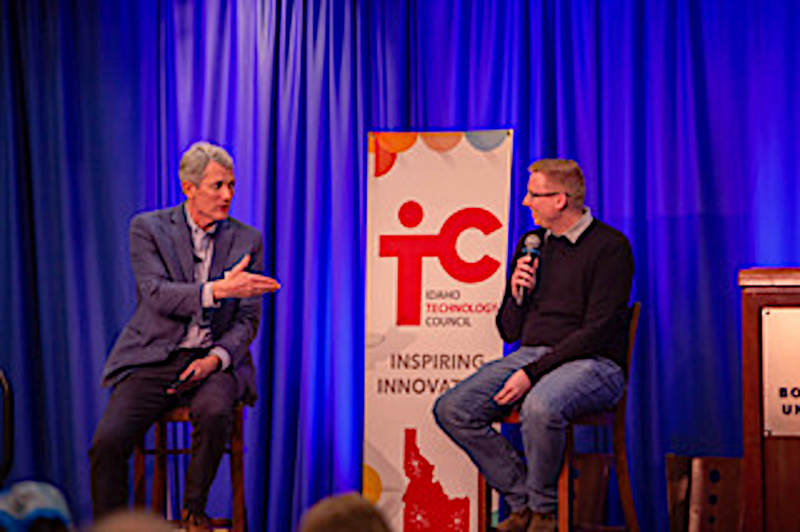
Rich Ramondi, ITC founding chair, 2012. Tech Co, SA by 2.0.
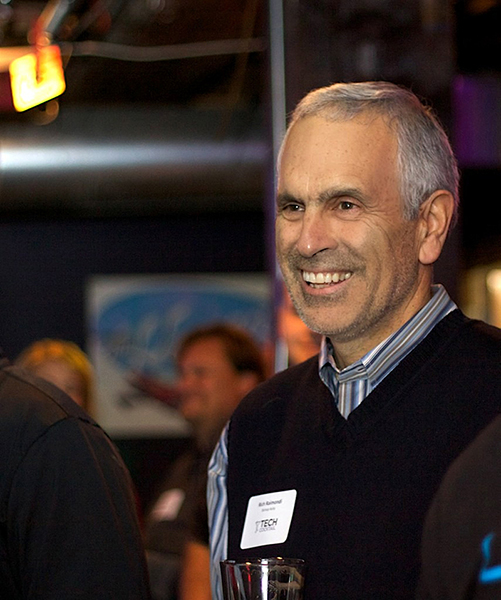
Hadi Partovi, computer science educator, at Boise State University. Idaho Technology Council.
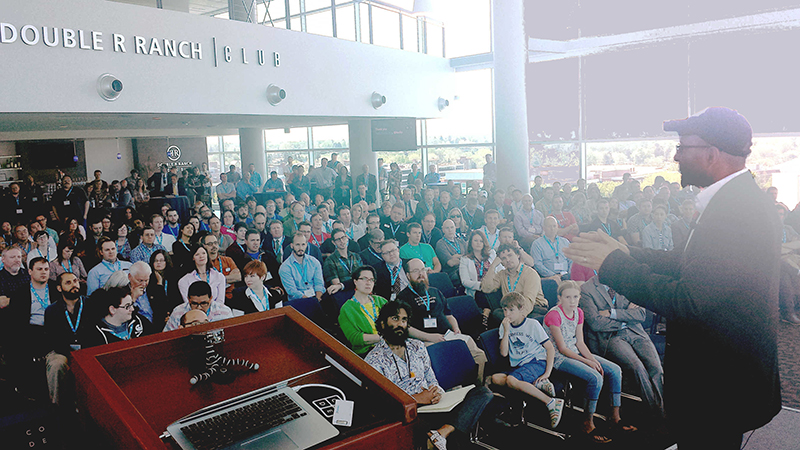
An Idaho Technology Council Mixer in Boise, 2012. Tech Co, SA by 2.0

At the mixer. Tech Co, SA by 2.0.
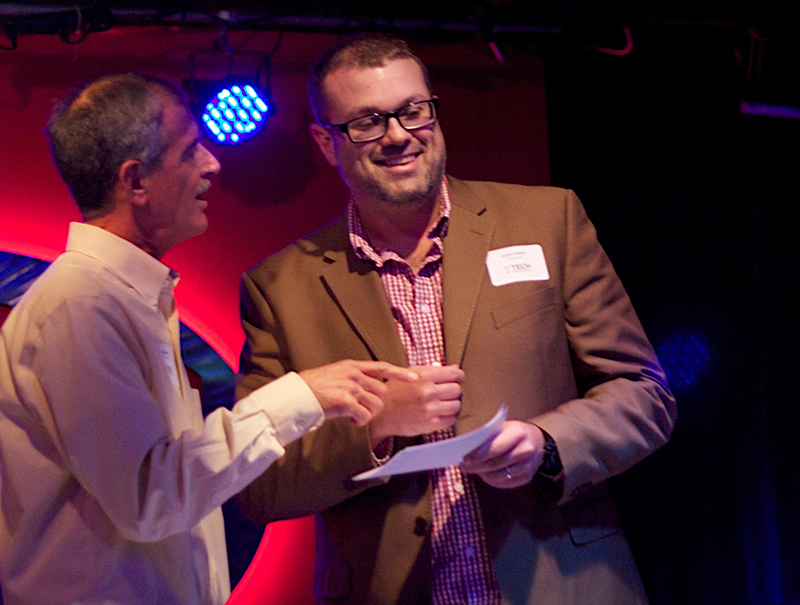
I don’t think jargon has a place in conversation with people who don’t speak that particular brand of it. And when those people swallow their pride and ask, “What does that mean, exactly?” they don’t deserve to be scoffed at or condescended to—especially by professionals who might well be a quarter-century or a half-century younger than they are. In the technology sector, if industry members would scrap this unfortunate way of communicating, they could meet businesspeople halfway who are still slightly tech-adverse and may believe they’re being left behind.
When I founded the Idaho Technology Council (ITC) fourteen years ago, the board and I shared a desire to represent the more than 120,000 employees of Idaho companies, universities, colleges, and other organizations as they navigated their way through the currents and shoals of a vast new ocean of business opportunities. We felt that industries needed a unified voice, not only to drive innovation but to strengthen Idaho’s business ecosystem. We now have a strong middle market that has created products to meet customer demand at the national and global levels—in health care and financial technology, in the devices and software that exchange data in the so-called Internet of Things, in transportation, agriculture, energy, wood products, and more.
I see many innovations coming from Idaho citizens—from drones, GPS, cloud services, cyber-security applications and education tools, to precision agriculture, financial tools, and more. We’re growing closer through the application of technology, which Idaho’s bedrock industry, agriculture, has embraced from the beginning.
Yet I’m surprised as I’ve crisscrossed my state and the country to discover that some traditional businesses either fear or simply mistrust tech, even though it’s been their road to the future—from the telegraph to fax machines to email to texting in its various forms—and has helped them to sustain the present they worked so hard to build.
From the 2000s to today, early-stage companies in Idaho have grown to become world leaders in their business categories, thanks to risk-taking innovators. These companies must continue to innovate—and that starts with their employees and with how they communicate. As George Bernard Shaw remarked (or maybe Oscar Wilde, it’s debatable), “Britain and America are two nations divided by a common language.” At ITC, we found and continue to find daily that the brave new world of artificial intelligence (AI) and other mind-blowing innovations isn’t as good at explaining itself as it is at expanding its sphere of influence. That sphere is now shedding its outer skin as it takes on the proportions of a galaxy. Its ultimate goal appears to be occupation of the known universe. Call it science non-fiction.
If clear language helps to explain thought, then the first place to start on reform of technical jargon might be with acronyms. Do you know how many things “PI” can mean? The website “Acronym Finder” lists more than two hundred meanings. From private investigator to principal investigator, from purchase order to performance improvement, from predictive index to personal injury.
Creation of a simple glossary of acronyms to precede a tech presentation wouldn’t insult anyone’s intelligence and could go a long way to establishing a meaningful bridge from the past to the present and future. The website TechTerms has about fifteen hundred words and phrases in its free dictionary but hundreds of other words and acronyms are coming our way whose definitions are not widely available.
I’m talking about terms routinely batted around in the tech industry, such as “AGI,” which stands for artificial general intelligence, a relatively new term that predicts a more advanced version of AI than we currently know is in the pipeline. Another example is “agentive” systems, which can autonomously take action to achieve an aim. Such a system can perform without constant supervision, just like the best employees.
I think some of the new jargon is meant to make us react with wonder and to not ask questions. But people should ask questions about all forms of technology, just as they once marveled at how someone on the other side of the world could send them a cable or a fax. Since oceans no longer divide us, I say let’s make sure language doesn’t either.
This content is available for purchase. Please select from available options.
Purchase Only
Purchase Only

